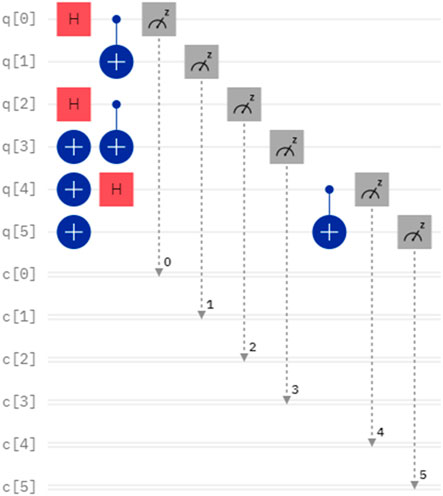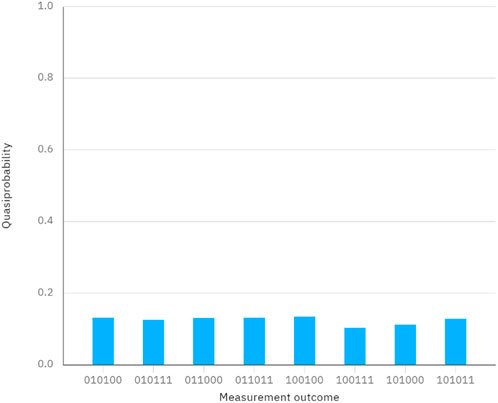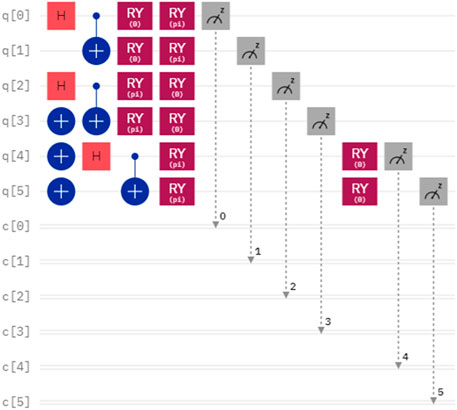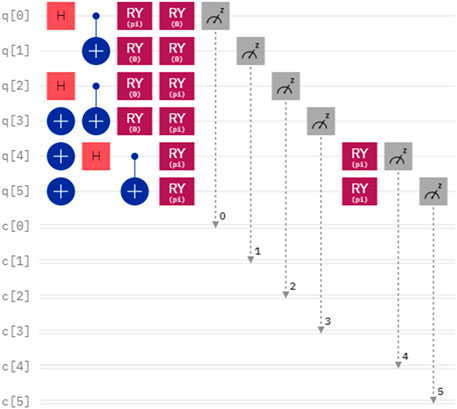- 1School of Computer Science, Sichuan University Jinjiang College, Meishan, China
- 2Network and Data Security Key Laboratory of Sichuan Province, University of Electronic Science and Technology of China, Chengdu, China
- 3Chengdu Municipal Public Security Bureau, Chengdu, China
The socialist millionaire problem aims to compare the equality of two inputs from two users while keeping their inputs undisclosed to anyone. Quantum private comparison (QPC), whose security relies on the principles of quantum mechanics, can solve this problem and achieve the information-theoretic security of information processing. The current QPC protocols mainly utilize the bitwise XOR operation to implement the comparison, leading to insufficient security. In this paper, we propose a rotation operation-based QPC protocol to solve the socialist millionaire problem, which utilizes Bell states as quantum resources and rotation operations for classical calculations. The proposed protocol only utilizes easy-to-implement technologies such as Bell states, rotation operations, and Bell-basis measurements, making it more practical. The analysis demonstrates that our protocol can meet both the correctness and security requirements. Compared with the existing QPC protocols, our protocol has improved performance in terms of practicability and security.
1 Introduction
With the rapid development of quantum computing, there is a growing concern about the security and privacy of information transmission. Securing traditional encryption methods is no longer reliable due to the emergence of quantum algorithms (Shor’s algorithm [1] and Grover’s algorithm [2]). In order to enhance the security of information transmission, quantum cryptography, whose security is based on the principles of quantum mechanics, has become a focus and attracted much attention. The basic principles of quantum mechanics, such as quantum entanglement, non-cloning, the uncertainty principle, and the superposition principle, enable quantum communication to achieve information-theoretic security. In this context, quantum cryptography protocols, including quantum key distribution (QKD) [3, 4], quantum key agreement (QKA) [5–7], quantum secure direct communication (QSDC) [8, 9], and quantum secret sharing (QSS) [10, 11], have been proposed to address various cryptographic tasks.
The millionaire problem, a primitive of secure multi-party computing (SMC), was proposed by [12] in 1982. In this scenario, two millionaires aim to determine who is wealthier without disclosing their individual wealth. On the basis of Yao’s research, the socialist millionaire problem, a variant of the millionaire problem, was proposed by [13], in which two millionaires sought to compare whether their wealth was equal. However, [14] pointed out that calculating an equality function involving only two parties in the two-party computation setting is not secure. A semi-honest third party is inevitably introduced to complete the design of a secure private comparison protocol.
Quantum private comparison (QPC) utilizes the principles of quantum mechanics to ensure the security of private information. The goal of this project is to solve the socialist millionaire problem, which aims to determine whether the private inputs of the participants are equal while keeping their inputs undisclosed. The first QPC protocol was proposed by [15], in which two users compare their secrets using EPR pairs as quantum information carriers. Decoy photons and a one-way hash function are employed to ensure the security of the protocol. [16] introduced a QPC protocol based on triplet-entangled states in which the comparison result can be obtained even if not all data are compared completely. This is because the private inputs are divided into multiple groups, which leads to an improvement in efficiency. However, [17] pointed out that [16] is susceptible to intercept resend attacks, and some suggestions are provided to enhance the security of private information. After that, some researchers focus on using different quantum states, such as single photons [18, 19], Bell states [20], multi-qubit states [21–24], and high-dimensional quantum states [25–28], and various encoding methods to develop the QPC protocol. Additionally, semi-quantum private comparison (SQPC) protocols [29–36] have been proposed to alleviate the burden on quantum resources. These protocols allow participants with limited quantum abilities to compare their secrets.
[37] proposed a QPC protocol without a classical part that utilizes quantum gates for classical calculations, resulting in improved quantum security. [38] proposed a QPC protocol without requiring a third party. [39] utilized the property of entanglement swapping of Bell states to design a QPC protocol in which each round can compare three-bit classical information. In 2022, an eight-qubit entangled state was used for designing private comparison, which utilizes decoy photons and QKD technology to ensure security [40]. [41] designed a QPC protocol to compare whether single-qubit states are equal with rotation encryption and swap test. [42] employed 4D GHZ-like states as quantum resources to design the QPC protocol.
According to the analysis of previous QPC protocols, it is evident that the bitwise XOR operation is primarily used for comparisons in the design of QPC protocols. This process will result in classical results that exist in intermediate computations and are susceptible to attacks by classical attackers. In this paper, we propose a QPC protocol to solve the socialist millionaire problem using Bell states. This approach utilizes rotation operations to replace the bitwise XOR operation. No classical results are produced, resulting in enhanced security. In addition, it is straightforward to implement with current technology. In our protocol, the private inputs are encoded as the angles of the rotation operation. They can be compared with the assistance of a semi-honest third party who may exhibit unfaithful behavior but will perform the protocol process faithfully. TP is responsible for preparing the initial Bell states at the beginning of the protocol and conducting the Bell-basis measurement to obtain the classical result at the end. The participants only need to encode their inputs as angles and perform the rotation operation on the received quantum states. Compared to the previous protocols, our protocol has the following advantages: we use rotation operations instead of the bitwise XOR operation for classical calculations, which results in improved security. Complex quantum technologies, such as high-dimensional quantum states, entanglement swapping, and joint measurements, are not necessary. Our protocol only utilizes easy-to-implement technologies such as Bell states, rotation operations, and Bell-basis measurements, making it more practical. In other words, our protocol demonstrates superior performance in terms of practicability and security.
The remainder of this paper is organized as follows. Section 2 introduces the core method of rotation operation. The details of the proposed rotation operation-based quantum solution for the socialist millionaire problem are provided in Section 3. Two simulation experiments and the analysis of the proposed protocol are presented in Sections 4, 5, respectively. Finally, the conclusion is provided in Section 6.
2 Rotation operation
The rotation operation can be represented by the following matrix:
Eq. 1 can be considered a unitary matrix rotated around the y-axis with an angle
In order to obtain
Four types of Bell states can be represented as follows:
When performing rotation operations on Bell states, we observe the following special features:
Lemma 1.
Proof. Without the loss of generality, let us consider
In the same way, we can prove that
Thus,
Lemma 1 holds.
Lemma 2.
Proof: Without the loss of generality, let us consider
Since the global phase has no observable effect, we can easily infer that
In the same way, we can prove that
Thus,
Lemma 2 holds.
Lemma 3.
Proof: Without the loss of generality, let us consider
Since the global phase has no observable effect, we can easily infer that
In the same way, we can prove that
Thus,
Lemma 3 holds.
3 Quantum solution for the socialist millionaire problem
In the description of the socialist millionaire problem, there are two users, Alice and Bob, each having their own secrets X and Y, respectively. They sought to compare whether X = Y while keeping X and Y undisclosed to each other, and they learn nothing if
The binary representations of X and Y are
Step 1: Charlie prepares a 2n-length quantum sequence
Step 2: Charlie generates 2m decoy photons randomly chosen from
Step 3: When receiving
Step 4: Alice performs rotation operations
Step 5: Alice (Bob) follows the same procedures, which involve inserting decoy photons to generate
Step 6: Charlie performs Bell-basis measurements on
4 Simulation experiments
Considering a case, the secrets of Alice and Bob are denoted as X = 6 and Y = 6, which can be represented in binary form as
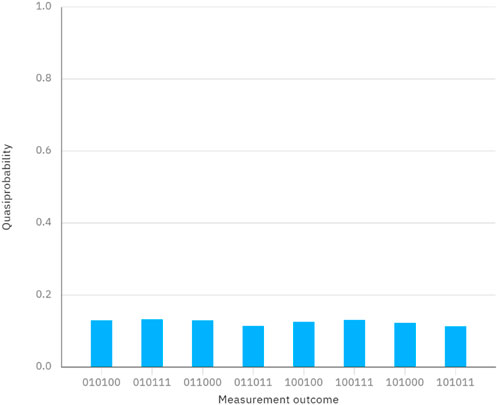
Figure 4. Measurement outcomes when performing the quantum circuit in Figure 3.
Considering another case, the secrets of Alice and Bob are denoted as
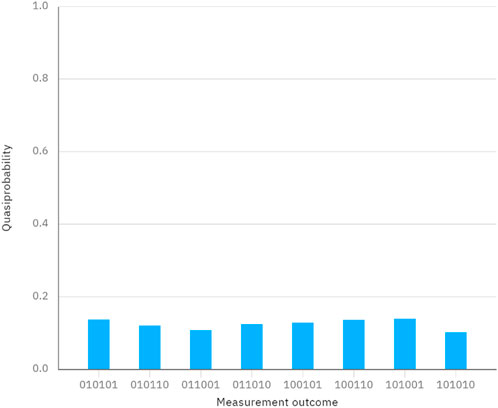
Figure 6. Measurement outcomes when performing the quantum circuit in Figure 5.
In conclusion, these two simulations reveal the correctness and feasibility of our protocol.
5 Analysis
5.1 Correctness
Without the loss of generality, we take
Without the loss of generality, we set
Case I. When
When performing Bell-basis measurement on
Case II. When
When performing Bell-basis measurement on
Case III. When
When performing Bell-basis measurement on
Case IV. When
When performing Bell-basis measurement on
The same method can be used to verify the 2n-length quantum sequence S, which could help confirm the protocol’s correctness.
5.2 Security analysis
In this section, we will demonstrate that the proposed protocol is resistant to both external and insider attacks. More specifically, any eavesdroppers attempting to steal the private inputs will be inevitably detected. One participant cannot access the private input of another participant, even if they process the immediate result. TP, who knows the comparison result, cannot learn the private inputs.
5.2.1 External attacks
Suppose that an outsider eavesdropper, Eve, with quantum capabilities, attempts to steal the private inputs. Various quantum attacks, including intercept–measure–resend attacks, man-in-the-middle attacks, and correlation–elicitation attacks, are frequently mentioned as methods to steal information. However, if the decoy-state method is used to detect the eavesdropper, any eavesdropping in the quantum channel will be detected, and the quantum communication protocol will be aborted. The decoy-state method can be considered an effective approach to detecting the presence of an eavesdropper, as validated in [43]. Since the quantum sequence transmitted in the quantum channel includes both target states and non-orthogonal states (decoy photons) that cannot be distinguished by Eve, Eve has to consider both of them as the target states and perform the same operation
where
Moreover,
where
It can be easily seen that regardless of the sample photons, the auxiliary quantum system will always be in state
In addition, the rotation operations performed on the initially prepared Bell states result in the transmitted quantum states containing four different types (
5.2.2 Insider attacks
The insider participants (Charlie, Alice, and Bob) may launch attacks to steal private inputs. Two cases of participants’ attacks are analyzed as follows:
Case 1. Attack from TP
In our protocol, the semi-honest TP will execute the protocol process faithfully, but she cannot conspire with any participants. She may steal some useful information through the protocol loophole. Throughout the entire process, TP is involved in preparing the initial Bell states at the beginning of the protocol and conducting the Bell-basis measurement to obtain the classical result at the end. Although she knows the final comparison result, she still cannot infer the private inputs. For example, when Alice and Bob perform rotation operations
Case 2. Attack from Alice or Bob
The roles of Alice and Bob are identical. Without the loss of generality, assume that dishonest Alice tries to obtain Bob’s private information. Bob’s private inputs are encoded into the rotation operation
5.3 Efficiency and comparison
In the QPC protocol, qubit efficiency [44] can be used to evaluate the utilization of quantum states, which is defined as
where
From Table 1, we can observe that the qubit efficiency and quantum resource of our protocol compared to [39] are identical, but our approach involves rotation operations and Bell-basis measurements instead of entanglement swapping and GHZ-basis measurements. This modification makes our protocol easier to implement and facilitates comparison. Compared with [40], our protocol demonstrates superior performance in quantum resource utilization, as the preparation of eight-qubit entangled states poses a significant challenge. Additionally, [39, 40] require the bitwise XOR operation for comparison, leading to inadequate security. Although [15] and our protocol mainly utilize unitary operations, our protocol has higher qubit efficiency. Implementing [15, 16, 19] is easy with current technology, but the qubit efficiency is relatively low. It must be noted that our protocol has an advantage in terms of security compared with [16, 39, 40] since the participants (Charlie, Alice, and Bob) do not perform any classical operations, including the bitwise XOR operation, and record the intermediate computations because the classical computation is replaced by the rotation operation. Therefore, a classical attacker has a lower chance of performing successful attacks because no classical result is produced, significantly reducing the probability of stealing private information. This could contribute to the better security of the QPC protocol.
6 Conclusion
To sum up, in this paper, we propose a rotation operation-based QPC protocol to solve the socialist millionaire problem. The protocol utilizes Bell states as quantum resources and rotation operations for classical calculations. The private inputs of the participants are encoded into the rotation operations, and no classical result is produced. This effectively reduces the risk of classical attacks and enhances the security of the QPC protocol. Compared with the current QPC protocols, complex quantum technologies such as high-dimensional quantum states, entangled swapping technology, and joint measurements are not required. Our protocol only utilizes easy-to-implement technologies such as Bell states, rotation operations, and Bell-basis measurements. All of these improvements could not only make our protocol more practical but also enhance its security. In other words, our protocol demonstrates superior performance in terms of practicability and security. In the future, we will focus on designing a semi-quantum private comparison to reduce the demand for quantum resources and develop a more efficient QPC protocol.
Data availability statement
The original contributions presented in the study are included in the article/Supplementary Material; further inquiries can be directed to the corresponding author.
Author contributions
MH: conceptualization, formal analysis, funding acquisition, investigation, methodology, and writing–original draft. S-YS: writing–review and editing. WZ: funding acquisition, supervision, and writing–review and editing.
Funding
The authors declare that financial support was received for the research, authorship, and/or publication of this article. This work is supported by the Open Fund of Network and Data Security Key Laboratory of Sichuan Province (grant no. NDS2024-1) and the Gongga Plan for the “Double World-class Project.”
Conflict of interest
The authors declare that the research was conducted in the absence of any commercial or financial relationships that could be construed as a potential conflict of interest.
Publisher’s note
All claims expressed in this article are solely those of the authors and do not necessarily represent those of their affiliated organizations, or those of the publisher, the editors, and the reviewers. Any product that may be evaluated in this article, or claim that may be made by its manufacturer, is not guaranteed or endorsed by the publisher.
References
1. Shor PW. Polynomial-time algorithms for prime factorization and discrete logarithms on a quantum computer. SIAM Rev (1999) 41(2):303–32. doi:10.1137/S0036144598347011
2. Grover LK. Quantum mechanics helps in searching for a needle in a haystack. Phys Rev Lett (1997) 79(2):325–8. doi:10.1103/PhysRevLett.79.325
3. Bennett CH, Brassard G. Quantum cryptography: public key distribution and coin tossing. Theor Comput Sci (2014) 560:7–11. doi:10.1016/j.tcs.2014.05.025
4. Zhang W, van Leent T, Redeker K, Garthoff R, Schwonnek R, Fertig F, et al. A device-independent quantum key distribution system for distant users. Nature (2022) 607(7920):687–91. doi:10.1038/s41586-022-04891-y
5. Huang X, Zhang SB, Chang Y, Qiu C, Liu DM, Hou M. Quantum key agreement protocol based on quantum search algorithm. Int J Theor Phys (2021) 60:838–47. doi:10.1007/s10773-020-04703-x
6. Zhou NR, Liao Q, Zou XF. Multi-party semi-quantum key agreement protocol based on the four-qubit cluster states. Int J Theor Phys (2022) 61(4):114. doi:10.1007/s10773-022-05102-0
7. Li HH, Gong LH, Zhou NR. New semi-quantum key agreement protocol based on high-dimensional single-particle states. Chin Phys B (2020) 29(11):110304. doi:10.1088/1674-1056/abaedd
8. Huang X, Zhang S, Chang Y, Yang F, Hou M, Chen W. Quantum secure direct communication based on quantum homomorphic encryption. Mod Phys Lett A (2021) 36(37):2150263. doi:10.1142/S0217732321502631
9. Sheng YB, Zhou L, Long GL. One-step quantum secure direct communication. Sci Bull (2022) 67(4):367–74. doi:10.1016/j.scib.2021.11.002
10. Hillery M, Bužek V, Berthiaume A. Quantum secret sharing. Phys Rev A (1999) 59(3):1829–34. doi:10.1103/PhysRevA.59.1829
11. Shen A, Cao XY, Wang Y, Fu Y, Gu J, Liu WB, et al. Experimental quantum secret sharing based on phase encoding of coherent states. Mech Astron (2023) 66(6):260311. doi:10.1007/s11433-023-2105-7
12. Yao AC. Protocols for secure computations. In: 23rd annual symposium on foundations of computer science (sfcs 1982); November 1982; Chicago, IL, USA (1982). p. 160–4.
13. Boudot F, Schoenmakers B, Traore J. A fair and efficient solution to the socialist millionaires’ problem. Discrete Appl Math (2001) 111(1-2):23–36. doi:10.1016/S0166-218X(00)00342-5
14. Lo HK. Insecurity of quantum secure computations. Phys Rev A (1997) 56(2):1154–62. doi:10.1103/PhysRevA.56.1154
15. Yang YG, Wen QY. An efficient two-party quantum private comparison protocol with decoy photons and two-photon entanglement. J Phys A: Math Theor (2009) 42(5):055305. doi:10.1088/1751-8113/42/5/055305
16. Chen XB, Xu G, Niu XX, Wen QY, Yang YX. An efficient protocol for the private comparison of equal information based on the triplet entangled state and single-particle measurement. Opt Commun (2010) 283(7):1561–5. doi:10.1016/j.optcom.2009.11.085
17. Lin J, Tseng HY, Hwang T. Intercept–resend attacks on Chen et al.'s quantum private comparison protocol and the improvements. Opt Commun (2011) 284(9):2412–4. doi:10.1016/j.optcom.2010.12.070
18. Hou M, Wu Y. Single-photon-based quantum secure protocol for the socialist millionaires’ problem. Front Phys (2024) 12:1364140. doi:10.3389/fphy.2024.1364140
19. Huang W, Wen QY, Liu B, Gao F, Sun Y. Robust and efficient quantum private comparison of equality with collective detection over collective-noise channels. Sci China Phys Mech Astron (2013) 56:1670–8. doi:10.1007/s11433-013-5224-0
20. Liu W, Wang YB, Cui W. Quantum private comparison protocol based on Bell entangled states. Commun Theor Phys (2012) 57(4):583–8. doi:10.1088/0253-6102/57/4/11
21. Xu QD, Chen HY, Gong LH, Zhou NR. Quantum private comparison protocol based on four-particle GHZ states. Int J Theor Phys (2020) 59:1798–806. doi:10.1007/s10773-020-04446-9
22. Ji ZX, Zhang HG, Fan PR. Two-party quantum private comparison protocol with maximally entangled seven-qubit state. Mod Phys Lett A (2019) 34(28):1950229. doi:10.1142/S0217732319502298
23. Ji Z, Zhang H, Wang H. Quantum private comparison protocols with a number of multi-particle entangled states. IEEE Access (2019) 7:44613–21. doi:10.1109/ACCESS.2019.2906687
24. Chang Y, Zhang WB, Zhang SB, Wang HC, Yan LL, Han GH, et al. Quantum private comparison of equality based on five-particle cluster state. Commun Theor Phys (2016) 66(6):621–8. doi:10.1088/0253-6102/66/6/621
25. Jia HY, Wen QY, Song TT, Gao F. Quantum protocol for millionaire problem. Opt Commun (2011) 284(1):545–9. doi:10.1016/j.optcom.2010.09.005
26. Yu CH, Guo GD, Lin S. Quantum private comparison with d-level single-particle states. Physica Scripta (2013) 88(6):065013. doi:10.1088/0031-8949/88/06/065013
27. Guo FZ, Gao F, Qin SJ, Zhang J, Wen QY. Quantum private comparison protocol based on entanglement swapping of d-level Bell states. Quan Inf Process (2013) 12(8):2793–802. doi:10.1007/s11128-013-0536-6
28. Wang B, Gong LH, Liu SQ. Multi-party quantum private size comparison protocol with d-dimensional Bell states. Front Phys (2022) 10:981376. doi:10.3389/fphy.2022.981376
29. Zhou NR, Xu QD, Du NS, Gong LH. Semi-quantum private comparison protocol of size relation with d-dimensional Bell states. Quan Inf Process (2021) 20:124–15. doi:10.1007/s11128-021-03056-6
30. Gong LH, Li ML, Cao H, Wang B. Novel semi-quantum private comparison protocol with Bell states. Laser Phys Lett (2024) 21(5):055209. doi:10.1088/1612-202X/ad3a54
31. Gong LH, Chen ZY, Qin LG, Huang J. Robust multi-party semi-quantum private comparison protocols with decoherence-free states against collective noises. Adv Quan Tech (2023) 6(8):2300097. doi:10.1002/qute.202300097
32. Wang B, Liu SQ, Gong LH. Semi-quantum private comparison protocol of size relation with d-dimensional GHZ states. Chin Phys B (2022) 31(1):010302. doi:10.1088/1674-1056/ac1413
33. Li YC, Chen ZY, Xu QD, Gong LH. Two semi-quantum private comparison protocols of size relation based on single particles. Int J Theor Phys (2022) 61(6):157. doi:10.1007/s10773-022-05149-z
34. Wu WQ, Guo LN, Xie MZ. Multi-party semi-quantum private comparison based on the maximally entangled GHZ-type states. Front Phys (2022) 10:1048325. doi:10.3389/fphy.2022.1048325
35. Jiang LZ Semi-quantum private comparison based on Bell states. Quan Inf Process (2020) 19(6):180. doi:10.1007/s11128-020-02674-w
36. Lin PH, Hwang T, Tsai CW. Efficient semi-quantum private comparison using single photons. Quan Inf Process (2019) 18:207–14. doi:10.1007/s11128-019-2251-4
37. Lang YF Quantum gate-based quantum private comparison. Int J Theor Phys (2020) 59(3):833–40. doi:10.1007/s10773-019-04369-0
38. Wu WQ, Zhou GL, Zhao YX, Zhang H. New quantum private comparison protocol without a third party. Int J Theor Phys (2020) 59:1866–75. doi:10.1007/s10773-020-04454-9
39. Huang X, Zhang SB, Chang Y, Hou M, Cheng W. Efficient quantum private comparison based on entanglement swapping of bell states. Int J Theor Phys (2021) 60:3783–96. doi:10.1007/s10773-021-04915-9
40. Fan P, Rahman AU, Ji Z, Ji X, Hao Z, Zhang H. Two-party quantum private comparison based on eight-qubit entangled state. Mod Phys Lett A (2022) 37(05):2250026. doi:10.1142/S0217732322500262
41. Huang X, Chang Y, Cheng W, Hou M, Zhang SB. Quantum private comparison of arbitrary single qubit states based on swap test. Chin Phys B (2022) 31(4):040303. doi:10.1088/1674-1056/ac4103
42. Liu C, Zhou S, Gong LH, Chen HY. Quantum private comparison protocol based on 4D GHZ-like states. Quan Inf Process (2023) 22(6):255. doi:10.1007/s11128-023-03999-y
43. Huang X, Zhang W, Zhang S. Practical quantum protocols for blind millionaires’ problem based on rotation encryption and swap test. Physica A: Stat Mech its Appl (2024) 637:129614. doi:10.1016/j.physa.2024.129614
Keywords: socialist millionaire problem, quantum private comparison, bell states, rotation operation, security
Citation: Hou M, Sun S-Y and Zhang W (2024) Quantum private comparison for the socialist millionaire problem. Front. Phys. 12:1408446. doi: 10.3389/fphy.2024.1408446
Received: 28 March 2024; Accepted: 08 May 2024;
Published: 19 June 2024.
Edited by:
Nanrun Zhou, Shanghai University of Engineering Sciences, ChinaReviewed by:
Lihua Gong, Shanghai University of Engineering Sciences, ChinaMa Hongyang, Qingdao University of Technology, China
Run-Hua Shi, North China Electric Power University, China
Copyright © 2024 Hou, Sun and Zhang. This is an open-access article distributed under the terms of the Creative Commons Attribution License (CC BY). The use, distribution or reproduction in other forums is permitted, provided the original author(s) and the copyright owner(s) are credited and that the original publication in this journal is cited, in accordance with accepted academic practice. No use, distribution or reproduction is permitted which does not comply with these terms.
*Correspondence: Wei Zhang, emhhbmd3ZWlAc2N1amouZWR1LmNu
 Min Hou
Min Hou Shi-Yao Sun3
Shi-Yao Sun3